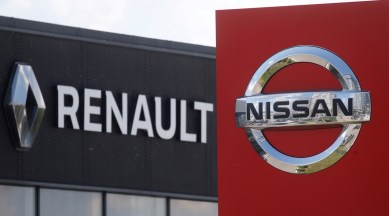Renault-Nissan to invest Rs 5,300 cr to bring 6 new models in India
Renault and Nissan will each introduce three new vehicles, which will be engineered and built in Chennai on common alliance platforms while retaining the individual, distinctive styling of the respective brands.

Upping its India play, the Renault-Nissan alliance on Monday announced a fresh investment of `5,300 crore in the country. The combine will soon roll out six new vehicles, including two new fully electric vehicles (EVs), for the domestic and international markets. The funds will also be used to upgrade the Renault-Nissan factory in Chennai into an international export hub.
Renault and Nissan will each introduce three new vehicles, which will be engineered and built in Chennai on common alliance platforms while retaining the individual, distinctive styling of the respective brands. They will include four new C-segment SUVs. Two new A-segment cars will be the first EVs for both Renault and Nissan in India, building on its expertise of both brands in mass-market electrification, which began with the Nissan LEAF and Renault Zoe more than a decade ago.
monthly limit of free stories.
with an Express account.
The strategy is to focus on high-quality SUVs and EVs for the local market. Ashwani Gupta, representative executive officer & COO, Nissan Motor Co, observed that Nissan’s strength is in SUVs and more than 70% of the company’s global sales come from the segment. “Magnite is a classic example in India and where we are missing today are in the A and C segments. We will be doubling our market coverage there,” Gupta said. With an eye on the export markets, the alliance will be developing left-hand driven Magnite.
As part of the renewed commitment to the Indian market, Renault and Nissan are realigning their shareholding in their joint operations. Renault Nissan Automotive India (RNAIPL) will see Nissan holding 51% of the equity while Renault will hold 49%. Renault Nissan Technology Business Centre (RNTBCI) will see 51% ownership by Renault and 49% by Nissan.
Gupta told media persons the new phase will see higher capacity utilisation and introduction of EVs, which will commence from 2025. “We are currently at below 50% capacity utilisation and are looking at scaling it up to 80% over a period of time. At present, we don’t have a plan to set up a new plant as we have got an excellent factory. But, of course, this site needs modernisation as we are going in for electrification of products,” Gupta said.
An MoU on the new investment commitment was signed in the presence of Tamil Nadu chief minister MK Stalin on Monday. In a new long-term strategy, the alliance is targetting higher production and R&D activity; it will launch EVs and transition to carbon-neutral manufacturing. Additional R&D activity will create up to 2,000 new jobs adding to the current workforce of 15,000.
On the EV products, Gupta said: “We believe that electric cars will be only competitive, if we are able to manage the vertical integration of the full supply chain. This is what we do in Japan, Europe, the US and China. These are the markets where we launched electric cars in 2010. In Japan, we own the battery plant, powertrain and vehicle manufacturing plants and all other connected software,” he said. According to him, by 2030, Nissan will have around 44% of its product mix as electrified cars globally.
Sajan C Kumar/FE